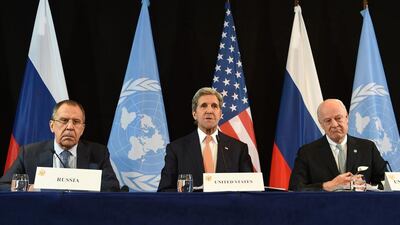BEIRUT // There are hopes that for the first time in nearly five years of war, a pause in fighting between government and rebel forces across Syria could go into force in just days.
On Friday, the 17-nation International Syria Support Group unanimously agreed to back a cessation of hostilities between Syrian government forces and rebels within one week.
The halt in fighting will allow the delivery of humanitarian aid to besieged areas across the country. Al Qaeda affiliate Jabhat Al Nusra, and ISIL are to be excluded from the agreement.
While the negotiated halt in fighting has been welcomed and is perhaps the biggest diplomatic development of the war, the agreement as it exists right now is not a lasting, formal ceasefire: it is only a temporary pause in fighting to allow in humanitarian aid.
While there is obviously hope that this pause could make the forces in Syria more amenable to negotiations and develop into a formal ceasefire, it is likely to be used by both sides as a chance to to catch their breaths, rearm and reinforce their positions. For civilians, it could be an opportunity to flee without worrying about getting caught in the crossfire of fighting or to receive humanitarian and medical aid in besieged areas.
Given that no large-scale ceasefires or pauses in fighting have been successfully implemented over the course of the war, Friday’s agreement was an important first step in a peace process that has so far stumbled.
Syria’s main opposition grouping did not immediately agree to the truce, however, saying that the situation would have to be studied.
“The project of a temporary truce to halt hostilities will be examined with the rebel factions on the ground,” said George Sabra, a member of the High Negotiations Committee, a body created to represent the group in peace talks with the regime.
On Twitter, committee head Riyad Hijab said the body would only agree to a halt in fighting on the condition that it was accepted by forces fighting on the war’s northern and southern fronts. In recent weeks the Syrian government – backed by Russia – has launched large-scale offensives in these areas.
Rebel forces in Aleppo, Syria’s second city, are now nearly encircled by regime troops after the government launched an offensive in the province on February 1. While US officials say that Russia initially called for a halt in fighting to begin on March 1, Washington, which backs the Syrian opposition, was worried that three more weeks of fighting would effectively crush rebel forces in the city. It instead pushed for an immediate stop to government offensives.
US secretary of state John Kerry said the agreement that the International Syria Support Group came to in Munich was what the opposition wanted.
“They wanted it called and defined as a cessation of hostilities. That is very much in line with their thinking and their hopes,” he said.
Mr Hijab added that an actual ceasefire would be conditional on the removal of Syrian president Bashar Al Assad from power.
Russia has said it will continue air strikes in Syria during any cessation of hostilities, meaning that the success of the truce could hinge on whether Moscow limits its raids to ISIL and Al Nusra targets and does not strike rebel targets.
“It is stated in our documents – and we talked about it – that [the] ceasefire will not include Islamic State, Jabhat Al Nusra and other affiliated organisations that were recognised as terrorist by the UN security council. That is why our Aerospace Defence Forces will carry on their operations against these organisations,” said Russian foreign minister Sergei Lavrov following the Munich meeting, according to Russia’s Tass state news agency.
But Russia’s definition of what constitutes a terrorist group is much broader than that of that of the United States, the Syrian opposition and other parties. Throughout its more than four-month-long bombing campaign in Syria, Moscow has defended carrying out raids on rebels fighting president Bashar Al Assad’s government, saying it was attacking terrorist groups. At times it even claimed that strikes on rebels were attacks on ISIL and Al Nusra.
While Russia has indeed struck ISIL and Al Nusra targets during its campaign, the bulk of their attacks have been against Syrian rebel forces.
Vladimir Djabarov, vice-president of Russia’s foreign affairs commission, reiterated on Friday that Moscow’s definition of terrorists in Syria was broader than ISIL and Al Nusra.
“There are too many groups that claim they are anti-government or anti-Assad when many are clearly terrorist groups,” he said, according to Tass, noting that Russia’s “counterterror” operation in Syria will continue despite the Munich agreement.
Two of the most powerful rebel factions – the hardline Salafist groups Aharar Al Sham and Jaish Al Islam – are allies of Al Nusra and explicitly labelled as terrorist organisations by Russia. While Ahrar Al Sham and Jaish Al Islam are more radical than other rebel groups, they are nonetheless considered by other rebels as key parts of the opposition. If Russia were to target these groups or other rebel factions during the planned halt in fighting, the cessation of hostilities would likely collapse.
foreign.desk@thenational.ae
* With reporting by Agence-France Presse and Associated Press

